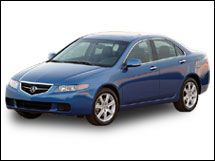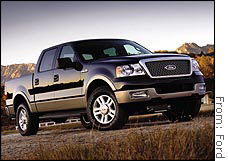NEW YORK (Money Magazine) - Cars are a lot like fashion.
There's a bargain basement, where unpopular brands, last year's styles and surplus goods are discounted. But like a bespoke suit, the best and most esteemed auto brands command full price -- or close to it.
That's the conundrum for car shoppers: There's never a half-off sale on the car you want, a Porsche hidden in the clearance rack.
Even so, auto dealers will gladly offer a fair price to any consumer who's done his or her homework and solicited bids from several rivals. Here's how to go about it.
Focus on the car, not the deal -- Make the vehicle your priority when you shop, not the rebates, lease deals or financing offers available. You'll avoid getting stuck with a model you didn't particularly want because of the lure of a so-called bargain.
Prices are at your fingertips -- The Internet has revolutionized car shopping. Combine information on the Web -- manufacturers and consumer publications have detailed sites -- with data from magazines, and there's no excuse for not doing your homework.
Many websites, like Kelley Blue Book's and Edmunds.com, let you research new and used models, compare transaction prices, dealer costs and incentives, and contact dealers to negotiate and scour inventory.
The dating game -- If you're still in the market for a 2003 car or truck, remember the annual game automakers play: Most 2004 models are already in showrooms by now, so any "new" 2003 car you buy today is really a year old. Dealers have no choice but to slash prices to get those '03s off their lots.
No shame in used - All that desperate dealing on new cars, along with a glut of used models coming off leases, has driven the average used-car price down to $10,400 as of August, compared with $12,000 last summer. (Used prices have risen in recent months, but remain well below traditional levels.) And of course, cars suffer their biggest depreciation hit in the first years of ownership.
The 2002 Lexus LS 430 sedan, which sold loaded for about $71,000, costs about $54,000 as a certified pre-owned car (with an extended warranty) at dealerships. Buy it from a private seller and you'll pay about $50,000, or nearly 30 percent off the original price.
No rebate or financing can save you that kind of money.
Hot deals

There's no rebate. No giveaways. But don't "tsk" over the TSX: At $26,990, the Acura doesn't need sales gimmicks. In fact, no other sedan currently delivers such levels of quality, luxury and performance for well under $30,000. With understated style and Swiss-watch precision, the TSX drives and feels like an expensive sports sedan. (The catch is a smallish back seat.) The TSX is based on a slightly downsized Honda Accord previously sold overseas, but it has a creamy 200-horsepower four-cylinder engine, taut handling and a deluxe interior that will satisfy Yankee tastes.

The Ford F-Series pickup has been America's top-selling vehicle for 21 years. And despite a lavish, expensive redesign for 2004, the F-150 carries a $22,010 to $36,365 sticker price that isn't significantly higher than the model it replaces. Throw in 2.9 percent interest on a three-year loan, and many F-Series owners can trade up to the new model with no increase in the monthly payment. It's Ford's way of ensuring that truck loyalists don't start eyeballing the cowboy competition -- a herd that now includes big Japanese trucks like Nissan's Titan.

Buyers get 5 percent off the retail price of any Mercedes C, E, SLK and CLK Class model if they visit Germany to adopt their new Benz. Mercedes' European delivery program (now in its 40th year) lets you pick up your car at the Sindelfingen factory, tool around the Continent, then drop the car off at one of 14 points in Europe for safe transport to a dealer back home. You cover your air fare, but there's no additional cost for the program, which includes all shipping and delivery fees, U.S. customs duty, a factory tour, a one-night hotel stay in Sindelfingen and 15 days of European auto insurance.

|

